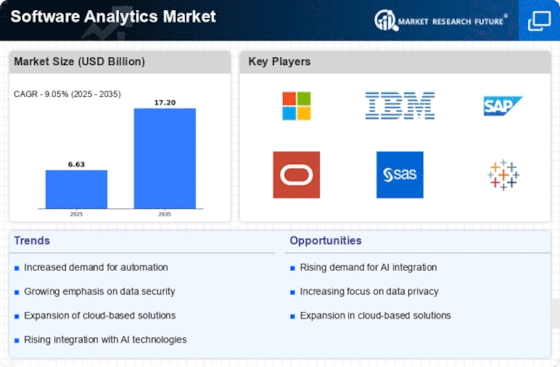Top Industry Leaders in the Software Analytics Market

Competitive Landscape of Software Analytics Market:
The Software Analytics market has witnessed substantial growth in recent years, driven by the increasing demand for data-driven insights in the software development lifecycle. As organizations strive to enhance their software quality, performance, and efficiency, the adoption of software analytics tools has become imperative. These tools provide in-depth analysis of various metrics, helping companies make informed decisions and optimize their software development processes.
Key Players:
Several key players dominate the Software Analytics market, each offering unique solutions to cater to diverse industry needs. Notable participants include:
- SAP SE (Germany)
- SAS Institute (U.S.)
- International Business Machine (U.S.)
- Oracle Corporation (U.S.)
- Tableau Software (U.S.)
- Microsoft Corporation (U.S.)
- Teradata Corporation (U.S.)
- Microstrategy Inc. (U.S.)
- Informatica (U.S.)
Strategies Adopted:
Key players in the Software Analytics market employ various strategies to maintain a competitive edge and cater to evolving industry demands:
- Product Innovation: Companies continually invest in R&D to develop advanced analytics features, providing customers with cutting-edge solutions that address the dynamic nature of software development.
- Strategic Partnerships: Collaboration with other technology providers, integration partners, and industry stakeholders allows companies to expand their market reach and offer comprehensive solutions to customers.
- Acquisitions: Strategic acquisitions enable companies to broaden their product portfolios, incorporate complementary technologies, and gain access to new customer segments, fostering overall market growth.
- Cloud Adoption: Embracing cloud-based analytics solutions enables companies to enhance scalability, accessibility, and flexibility, catering to the evolving preferences of organizations seeking agile and cost-effective software analytics solutions.
Factors for Market Share Analysis:
Several factors contribute to the analysis of market share in the Software Analytics sector:
- Product Portfolio: The diversity and effectiveness of software analytics tools within a company's portfolio directly impact its market share. A comprehensive suite covering various aspects of the software development lifecycle enhances competitiveness.
- Customer Base: The size and diversity of a company's customer base reflect its market penetration. A broad customer portfolio signifies widespread acceptance and trust in the company's software analytics solutions.
- Global Presence: The ability to establish a global presence through strategic partnerships, regional offices, and localized support contributes to a company's market share by ensuring accessibility to a diverse range of markets.
- Innovation and Adaptability: Companies that consistently innovate and adapt to emerging industry trends demonstrate resilience and are more likely to capture and retain market share in the dynamic Software Analytics landscape.
New and Emerging Companies:
While established players dominate the market, new and emerging companies are making noteworthy strides in the Software Analytics sector:
- Snyk: Specializing in security-focused analytics for software development, Snyk has gained traction by offering tools that identify and address security vulnerabilities in code, catering to the growing importance of secure software development practices.
- GitLab Inc.: Known for its integrated DevOps platform, GitLab provides analytics features that facilitate collaboration, efficiency, and visibility throughout the entire software development lifecycle.
- SonarSource: Focused on code quality and static code analysis, SonarSource has emerged as a key player in software analytics, helping organizations maintain high-quality code and reduce technical debt.
Current Company Investment Trends:
Companies in the Software Analytics market are actively investing in key areas to stay ahead of the competition and meet evolving customer demands:
- AI and Machine Learning: Investments in AI and machine learning technologies enhance the predictive analytics capabilities of software analytics tools, allowing organizations to anticipate issues, optimize workflows, and improve overall development efficiency.
- Cybersecurity Integration: Given the increasing importance of cybersecurity in software development, companies are investing in analytics tools that provide insights into potential vulnerabilities, ensuring that security remains a top priority throughout the development process.
- User Experience Analytics: Enhancing user experience is a significant focus area, with companies investing in analytics tools that provide insights into how end-users interact with software applications. This data enables organizations to make data-driven improvements to enhance user satisfaction.
- Collaborative Development: Investments in features that facilitate collaboration and communication among development teams are on the rise. Companies recognize the importance of streamlined workflows and effective communication for successful software development projects.
Latest Company Updates:
December 5, 2023: Tableau Software, a leading provider of business intelligence and data visualization solutions, announced the acquisition of Clearstory Data, a cloud-based data warehousing company. This move will strengthen Tableau's cloud offerings and enable customers to analyze data faster and more efficiently.
November 15, 2023: Gartner Inc., a leading research and advisory firm, published its annual "Magic Quadrant for Business Intelligence and Analytics Platforms" report. Microsoft Power BI topped the list, followed by Tableau Software, Qlik, and Domo.
October 26, 2023: Google Cloud announced the launch of Vertex AI Insights, a new software analytics platform that uses AI and machine learning to provide businesses with deeper insights into their software usage.
Jan 17-19, 2024: The Applied Predictive Analytics Conference (APAC) will take place in Las Vegas, Nevada. This event will bring together experts and practitioners to discuss the latest trends in predictive analytics and machine learning.
Jan 23-25, 2024: The Strata Data Conference will take place in Santa Clara, California. This event is one of the largest gatherings of data scientists and business analysts, focusing on big data, analytics, and AI.
Jan 7, 2024: Dynatrace, a SaaS performance monitoring platform, launched its AI-powered Dynatrace Davis™ platform. Davis uses machine learning to automatically detect and diagnose IT performance issues, saving time and resources for IT teams.
Jan 4, 2024: Google Cloud announced the launch of Vertex AI Workbench, a unified platform for building, deploying, and managing AI models. This platform simplifies the development process and makes AI more accessible to businesses.










